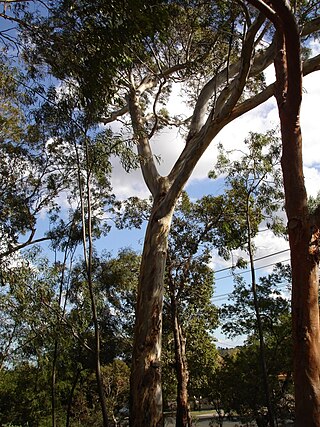
Eucalyptus leucoxylon, commonly known as yellow gum, blue gum or white ironbark, is a species of small to medium-sized tree that is endemic to south-eastern continental Australia. It has smooth yellowish bark with some rough bark near the base, lance-shaped or curved adult leaves, flower buds in groups of three and cylindrical, barrel-shaped or shortened spherical fruit. A widely cultivated species, it has white, red or pink flowers.

Eucalyptus goniocalyx, commonly known as long-leaved box, olive-barked box or bundy, is a species of small to medium-sized tree that is endemic to southeastern Australia. It has rough, fibrous or flaky bark, lance-shaped to curved adult leaves, flower buds in groups of seven, white flowers and cup-shaped, cylindrical or barrel-shaped fruit.
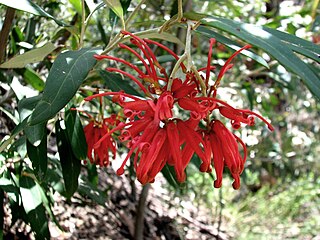
Grevillea victoriae, also known as royal grevillea or mountain grevillea, is a species of flowering plant in the family Proteaceae and is endemic to mountainous regions of south-eastern continental Australia. It is an erect to spreading shrub with elliptic to lance-shaped leaves, and pendulous clusters of red to orange flowers.

Passiflora herbertiana, or native passionfruit, is a widespread climbing twiner native to moist forests on the coast and ranges of eastern Australia. The subspecies P. h. insulae-howeiP.S.Green is endemic to Lord Howe Island in the Tasman Sea.

Melaleuca howeana, commonly known as tea tree, is a plant in the myrtle family, Myrtaceae and is endemic to the Lord Howe Island group, 600 km (400 mi) off the east coast of Australia. It is common in exposed areas, on cliffs and ridges, occasionally forming pure stands. Its closest mainland relative is Melaleuca ericifolia.

Pleioluma queenslandica, the blush condoo, is a large rainforest tree of the family Sapotaceae native to eastern Australia. It is found in sea side rainforest as well as the drier inland rainforests. From as far south as the Richmond River, New South Wales to Coen in tropical Queensland, and as far west as Melville Island, Northern Territory.

Planchonella is a genus of flowering trees in the gutta-percha family, Sapotaceae. Named in honour of Jules Émile Planchon, it was described by Jean Baptiste Louis Pierre. It contains around 110 mainly tropical species, which range from Pakistan through Southeast Asia and New Guinea to northern and eastern Australia, New Zealand, and the Pacific Islands. The genus is included in the larger genus Pouteria by some authorities, hence species such as Planchonella australis are also known as Pouteria australis.
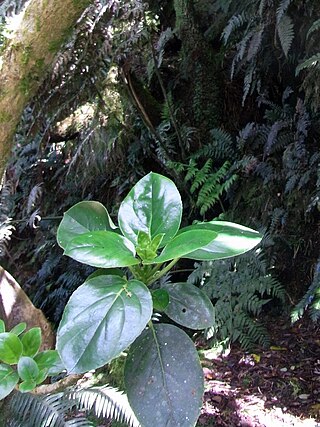
Negria is a plant genus in the family Gesneriaceae. Its only species is Negria rhabdothamnoides, commonly known as the pumpkin tree. It is related to Fieldia and Depanthus.

Denhamia is a genus of plants within the family Celastraceae, with species in Australia, New Guinea, and New Caledonia. The species inhabit a variety of environments, from rainforest to semi-arid savanna. All species grow as shrubs or small trees up to 10 metres in height. 17 species are currently accepted. Based on a molecular and morphological analysis, the genus was enlarged in 2011 to include several Australian and Pacific island species formerly classified as Maytenus – Denhamia bilocularis, D. cunninghamii, D. cupularis, D. disperma, D. fasciculiflora, D. ferdinandii, D.fournieri, and D. silvestris.
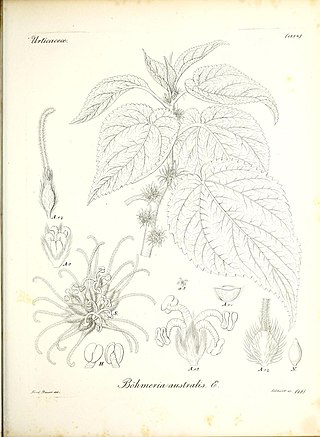
Pouzolzia australis, synonyms including Boehmeria australis and Boehmeria calophleba, is a species of large shrub or small tree in the plant family Urticaceae. It is endemic to small islands belonging to Australia and New Zealand – Norfolk Island, Lord Howe Island, and the Kermadec Islands. The population on Norfolk island, sometimes treated as a distinct subspecies, is critically endangered. In the Kermadec Islands, it was described in 2018 as "threatened – nationally endangered".
Planchonella maclayana is a tree in the family Sapotaceae. It grows up to 18 m (60 ft) tall with a trunk diameter of up to 25 cm (10 in). The fruits are roundish, up to 1.3 cm (1 in) long.
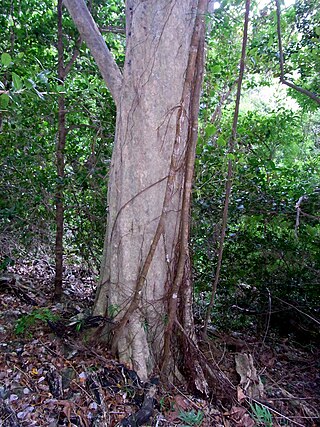
Celtis conferta subsp. amblyphylla, commonly known as cotton wood or cotton-wood, is a flowering plant in the hemp and hackberry family.
Melicytus novae-zelandiae subsp. centurionis is a flowering plant in the family Violaceae. It is a subspecies of Melicytus novae-zelandiae, known in New Zealand as coastal mahoe. The subspecific epithet honours the military Captain James Doran McComish (1881–1948), who made several visits in the 1930s to collect plants on Lord Howe Island.

Drypetes deplanchei subsp. affinis, commonly known as greybark or grey bark, is a flowering plant in the Putranjivaceae family. The subspecific epithet affinis alludes to its similarity to Drypetes sepiaria of India and Sri Lanka.
Leptospermum polygalifolium subsp. howense, commonly known as tea tree or tea-tree, is a flowering plant in the myrtle family, Myrtaceae. The subspecific epithet refers to the island to which the subspecies is endemic.
Planchonella reticulata is a flowering plant in the sapodilla family, Sapotaceae. It is a shrub or tree endemic to east-central New Caledonia. The specific epithet refers to the reticulate venation on the leaves.

Eucalyptus socialis, commonly known as the red mallee, or grey mallee, is a species of mallee that is endemic to inland Australia.

Planchonella myrsinifolia is a tree in the plant family Sapotaceae. It is native to Australia, with subspecies myrsinifolia native to Queensland and New South Wales on the Australian mainland, and subspecies howeana is endemic to Lord Howe Island.

Senna glutinosa is a species of flowering plant in the family Fabaceae and is endemic to central and northern arid areas of Australia. It is a shrub or small tree with pinnate leaves with up to seven pairs of leaflets, their shape depending on subspecies, and yellow flowers arranged in groups with ten fertile stamens in each flower.















